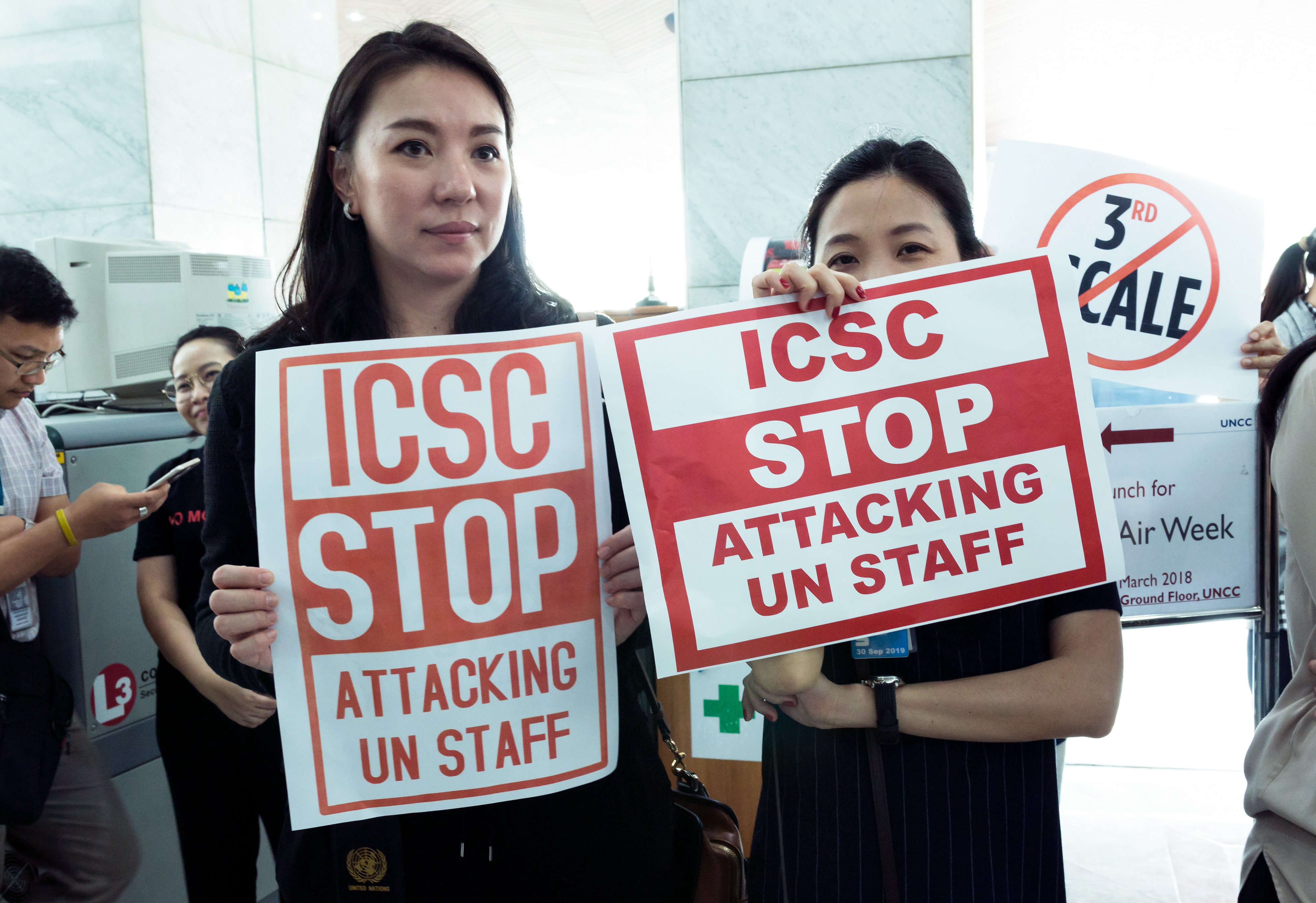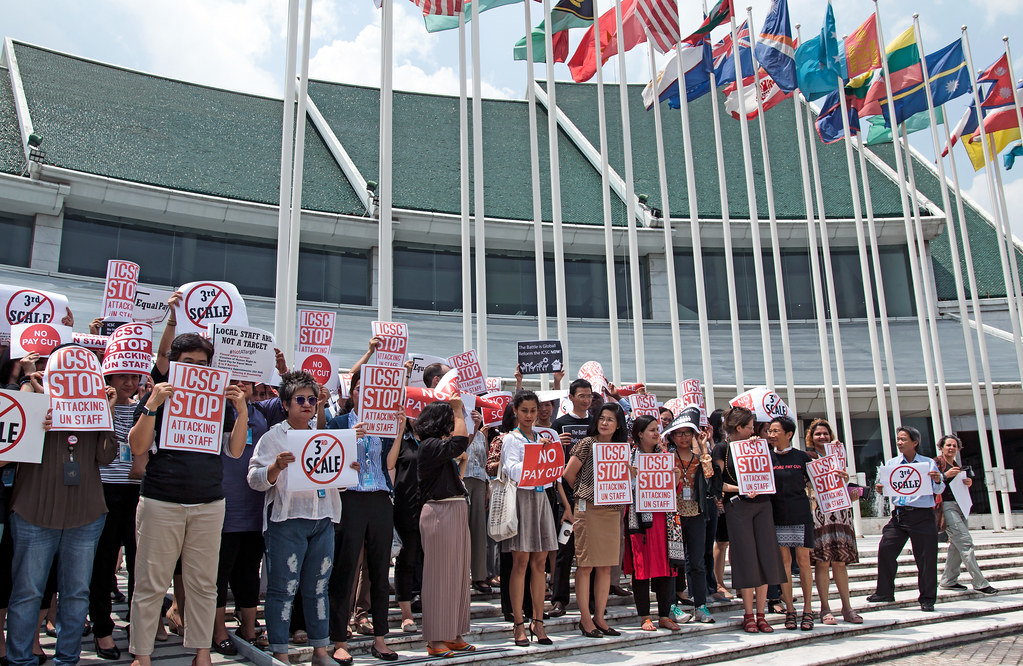Tensions are rising at the UN office or ‘duty station’ in Bangkok over plans to slash salaries for the second time in six years. The cuts are threatening morale and raising questions about the methodology and legality behind the proposed cuts.
History of ‘tier’ system
The UN first started cutting pay through a tiered system six years ago. All employees hired after March 2012 fell into a second tier and were paid 25-40% less than first-tier employees hired before the cut-off date. The new plan would relegate newly hired local staff to a third tier to be paid 13% less than their second-tier counterparts. If implemented, Bangkok would be the first UN duty station to have three classes of employees doing the same job, with the same qualifications, but receiving different pay.
Each UN duty station has two main categories of staff: professional and general services. Professional staff are typically recruited internationally and their salaries are set by reference to the highest-paying national civil service — which to date has been that of the United States. General services staff are recruited locally, and their salaries are meant to reflect the best prevailing conditions found locally for similar work.
The UN conducts a survey at each duty station every five years to measure the best salaries in the local labour market using a methodology determined by the International Civil Service Commission (ICSC).
Up until 2011, as a result of the surveys, average UN salaries increased in line with the average salaries in Thailand. But following the 2011 survey it was determined that any local staff hired after March 2012 would be paid on a secondary scale, with 25-40% lower salaries
Now, as a result of the 2016 survey, a third tier has been proposed for new locally recruited staff who will be paid 13% less than those with the same position who were hired before a cut-off date.
First and second-tier employee salaries will be frozen.
Human rights concerns
In addition to being the first UN duty station with three salary scales for employees, Bangkok has also faced the most drastic salary cuts compared to any other duty station with a two-tiered system, estimates Ian Richards, who represents UN unions and staff associations.
(2) Everyone, without any discrimination, has the right to equal pay for equal work.
UN employees have expressed frustration with the ‘tier’ system since it was first implemented in 2012, saying that it violates the UN principle of equal pay for equal work.
They also take issue with the way the salary system has been implemented, without any transparency or consultation with local staff. More than that, many say that the 2011 and 2016 salary surveys were improperly conducted with a premeditated agenda to reduce the salaries of locally hired staff. Bangkok employees tried to appeal the cuts through the UN’s internal justice system but their attempts were unsuccessful.
“It’s completely unacceptable to have three different salary scales for the same job,” said Richards. “It’s very demoralizing and very difficult.”
Richards said he was told by the head of the UN’s compensation unit in Bangkok that the 2011 cuts were so drastic because the local staff salaries were too close to international staff salaries, and he thought “there should be a bigger gap.”
It is unclear why salaries are being slashed this time.
“I’m not aware that the labour market in Bangkok has seen those kinds of movements,” added Richards. “This leads us to expect that something is not quite right. Because the same people are saying we should have reduced it even more. Their claims lack credibility in this case.”
Impact of pay cuts on morale
The salary tier system has affected staff morale and makes it harder to recruit and retain the best talent, said several UN employees at the Bangkok duty station who spoke on the condition of anonymity, citing a clause in the staff rules that forbids them from criticizing the UN in public.
“Staff in Bangkok are obviously furious, it’s devaluing their work,” said Richards.
The new system will not lower the salaries of existing staff, but temporary staff who were hoping to apply for a fixed-term contract now have to take the new salary scale into account.
“I already have a colleague complaining,” said one UN contractor. “He doesn’t have a fixed-term contract yet but he’s starting to complain that ‘if the salary decreases I won’t stay at the UN, I will go for the private sector.”
“It’s quite unfair for people who want to do a good job, the new blood of the UN generation who come to hold a fixed-term position and who can hold the responsibility and who can undertake work as a UN staffer — not as an individual contractor,” he went on to say. “It’s a kind of pride inside.”

One staff member on a temporary contract is awaiting a contract renewal and doesn’t know when the new salary tier will be imposed. She worries that her contract will be renewed with a lower salary — although other UN employees say the salary will not change unless there is a break in service or a switch to another agency.
She said the uncertainty has affected her ability to plan long-term — to buy a car, or a house. She also takes issue with how the tier system increases the pay disparity between the internationally recruited professional staff and the locally recruited general services staff.
“As an organization that focuses on human rights, we should not believe that foreigners can do better a job because we’re all human,” she said. “Each individual has their own expertise and we should be treated equally.”
Additionally, any UN employee who applies for a job in another UN agency will then be paid at the lower salary scale, which disincentivizes career development.
“Nobody's interested in career development,” as one UN employee put it. “There’s no interest in moving up.”
He recalled one locally recruited employee last year who realized a month after joining the UN that he was receiving a second-scale salary and ultimately quit.
“He was so upset that the UN was violating the principle of equal pay for equal work that he resigned from the UN. He was really depressed about this,” he recalled.
Questions about ICSC
The lack of transparency and consultation with local staff seemingly contradicts the labour rights principles outlined by the International Labour Organization and the
Sustainable Development Goals.
“Staff unions need to be engaged in any process of change that impacts workers and that hasn’t happened, which really reflects a major flaw in UN management if they’re not adhering to those processes of social dialogue and collective bargaining,” said Kate Lappin, Asia Pacific Secretary of Public Services International, a global federation of unions.
“And we can’t expect them to defend those human rights for workers across the world if they don’t apply them to their own,” she added.
The ICSC is now facing criticism from staff associations for its lack of independence, transparency, accountability and technical competency. This has led to claims that
the ICSC is influenced by governments with austerity agendas, although it is supposed to be an independent and impartial organization.
“We feel this is part of an overall trend across the UN where political interference has led to a downward and arbitrary trend in conditions of service,” said Richards. “We believe there has to be reform so that staff and representatives can have a say in how conditions are set.”
Employees say the salary tier system is an illegal way to cut costs, at the expense of those with the lowest salaries.
“If they don’t have money, so they have to do downsizing. But doing this underground cutting salaries like this, this is completely illegal,” one UN employee explained. “There has been no mandate to cut the salaries, or to cut costs.”
“It’s really clear this has to be done in consultation otherwise it’s illegitimate,” said Lappin.
Bangkok staff response
The UN staff association in Bangkok has staged various protests and strikes, even starting a hashtag #ICSCNoTrust.
Earlier this year employees faced pressure from managers not to participate in protests, even though collective action is permitted under UN rules. UN employees in Bangkok say they received an email from offices in New York reminding them that salaries would not be paid for the days they participate in the strike. One staffer said it was written in a way that was “quite threatening.”
After facing a backlash from the international community, the UN later clarified that employees are permitted to participate in protests.
“The UN is supposed to be addressing the growing levels of inequality around the world,” said Lappin. “One way that can be addressed is in stronger unions and the ability to take industrial action. If they are genuine they will strengthen those rights and not reduce them.”




